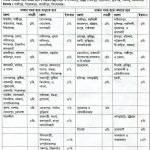Bangladesh expects to share the Teesta waters on a 50-50 basis during the lean period. An interim agreement on sharing the river waters for 15 years is likely to be signed during the visit of the Indian Prime Minister, Dr Manmohan Singh, on 6-7 September. The water resources minister, Ramesh Chandra Sen, said this on Friday. The Indian water resources minister, Pawan Bansal, will reach Dhaka on September 6 to attend the Joint River Commission (JRC) meeting to be held on the same day.
The secretary-level meeting of the JRC will be held on September 5, he said. “We are not getting enough water during the lean period for irrigation, but receive enough during the rainy season. During the past few years we have had only 5-7 cusecs of water in the Teesta in the lean period. After signing the agreement on the Teesta, we hope to get enough water during the dry season,” he added.
Sharing the waters of other common rivers – Dharla, Dudhkumar, Manu, Khowai, Gumti and Muhuri – between Bangladesh and India has also been finalised, the minister said. Bangladesh has agreed to give 50 cusecs of water from the Feni river to India for drinking water supply, Sen said. The main objective of the agreement on the Teesta aims at ensuring irrigation during the lean period by sharing its flow and stopping flooding in its basin, the minister added.
The multi-purpose Teesta barrage was constructed in 1981 for irrigation purpose, but Bangladesh could not use it fully owing to lack of flow in the river, Sen said, adding that, “the long outstanding problem in this regard would be resolved after signing the deal during the visit of Dr Singh.”
The minister further said the JRC meet will discuss every aspect of the agreement to iron out long standing problems between the two countries.
Bangladesh has only the Teesta barrage at Dalia in Lalmonirhat, while India has a barrage on the Teesta at Gazaldoba in Jalpaiguri, the Mahananda barrage at Fulbari and the Dahuk barrage at Chopra.
Sources in the water resources ministry said the water of the Teesta would be shared by measuring the amount of flow at the Gazaldoba point across the Bangladesh border. According to New Delhi’s proposal, India will retain 52 per cent, while Bangladesh will get 48 per cent of the water, sources in the water resource ministry said. The 15-year interim agreement will be signed on a 52-48 basis, but a long-term deal will be signed after observing the flow of water later, the Indian proposal added.
Bangladesh has already made an arrangement to share 75 per cent of the Teesta’s waters – about 5,400 million cubic metres. Under an agreement of 1983, India uses 39 per cent of the river waters, while Bangladesh gets 36 per cent. It’s the remaining 25 per cent that is the bone of contention. The issue gets complicated because groundwater mixes with the river water along its 90 km stretch from the Gajaldoba barrage in India to Bangladesh, making it difficult to measure the quantity of water, said a recent report.
“We have to know exactly how much water flows into the Teesta, how much water is regenerated from the ground water resources and how we can equitably divide 25 per cent of the remaining water between the countries,” Bansal said while talking to the media in Delhi recently.
“We have our own ideas, they have theirs. Bangladesh is not talking about regenerated water, which they get from the Teesta, whereas we are considering that,” said Bansal, adding that the two sides are looking at setting up a joint observation commission to collect the precise data. “I am very hopeful that this time we will be able to clinch the agreement,” said Bansal.
“There is a lot of understanding between the two countries.” Originating from the So Lomo Lake in Sikkim up in the Himalayas, the Teesta enters Bangladesh through Jalpaiguri and joins the mighty Brahmaputra after flowing 124 km inside Bangladesh. Talks between the water resources secretaries of the two countries, held on January 10, led to a framework for an interim agreement between the countries on sharing of the Teesta waters for 15 years.
The meeting managed to remove the long-standing misunderstanding over sharing the waters after successful talks in the capital.
The Indian water resources secretary, Dhruv Vijai Singh, led a six-member delegation and Bangladesh’s water resources secretary, Shaikh Wahid-uz-Zaman, led an 11-member team at the meeting.





